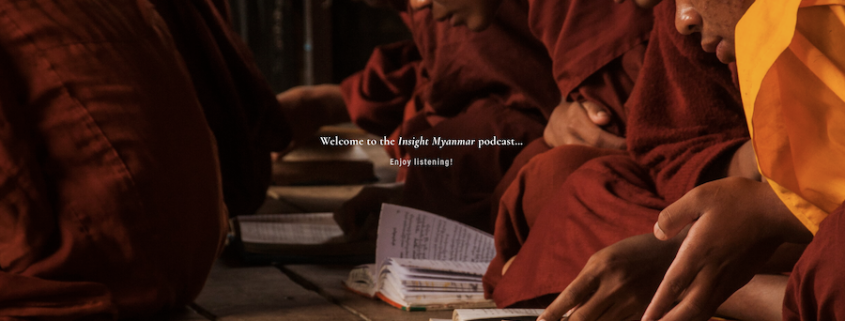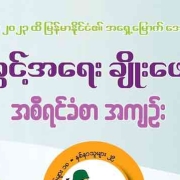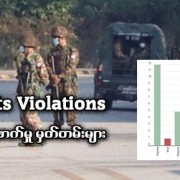The Insight Myanmar Podcast
Someday, when we have a reliable judicial system in the country or access to the international judicial system, we will use our documentation to seek justice for the victims of human rights violations, and achieve accountability,” says Han Gyi, a coordinator at the Network for Human Rights Documentation. Also known as ND-Burma, the organization has been at the forefront of pushing for human rights in Myanmar, and its efforts have only become more important with the exponentially increasing rate of human rights violations since the 2021 coup. This episode delves into the organization’s work in general, as well as the findings of their recently released report, “You Cannot Ignore Us.”
ND-Burma has several primary areas of focus: human rights documentation; accountability for the perpetrators of state-sponsored violence; and the utilization of data to seek justice, truth, and reparations for those who have experienced political imprisonment, arbitrary arrest, torture, killing, land grabs, forced relocation and other rights violations.
Since its 2004 founding, ND-Burma has pursued documentation as a main means for victims of human rights violations to seek justice. By conducting interviews with victims, families, and witnesses, ND-Burma creates needs assessments of how to best support the targets of large Tatmadaw operations. This has included victims from the 8888 Revolution, the Bogalay crisis, and vulnerable populations in Kachin and Shan states. In these interviews, victims have expressed their wish for receiving “some form of symbolic satisfaction to feel as if they have received justice.” This includes the request for public and private acknowledgment on the part of the perpetrators, as well as receiving the remains of those who have been killed by the military.
ND-Burma’s work focuses on ensuring justice for the victims, not punishing the perpetrators. It emphasizes what is called “transitional justice,” which Han Gyi contrasts with the concept of retribution, and which he defines as the “myriad of ways a country tries to deal with mass human rights violations that have been committed on its soil. It aims to deliver justice to the victims through accountability and redress, which in turn can contribute to building a society that respects the rule of law and guards against the same abuses happening again.” Their work is influenced by successful transitional justice programs developed in other countries, and they often invite outside expertise to assist with their implementation of reparations. “Transitional justice can be incorporated into law or guaranteed in the constitution,” says Han Gyi.
One key aspect of transitional justice is reparations. Examples of reparations include restitution (restoration of the victim’s situation as much as possible to what it was before the violation took place), monetary compensation, rehabilitation (in the form of medical, psychological, legal, and social services), and even just “symbolic satisfaction,” which has been a critical step for victims in healing psychological wounds and for rebuilding their lives. Often, what interviewees asked for was “truth-seeking, searches for the disappeared, recovery and reburial of remains, public acknowledgments and apologies, commemoration, and memorialization.”
Victims also routinely express a wish to receive a guarantee that such violations will not occur again. But Han Gyi notes that ensuring non-recurrence is only possible through institutional reform, which has proven impossible for decades in Myanmar, and is certainly not a likelihood now. “The military enjoys institutionalized impunity from the constitution and other oppressive laws,” he explains, and goes on to describe how prior to the coup, there was very low confidence in the domestic legal system (a subject that rule of law expert Kristina Simion discussed recently with us). “They investigate within a military court, not the civilian courts. So, there is very little transparency throughout the proceedings.” Soldiers are rarely convicted of committing misdeeds, and those few who are often receive immediate amnesty from the military. Han Gyi puts it succinctly: “According to our documentation, victims [of numerous human rights violations] never see justice.”
For years, ND-Burma made efforts to reform the institutions that protect the military from prosecution for their human rights violations. However, whenever they brought their work to government committees, even during the transition period, there was always a representative of the military present. “When we explained our report on reparations, victims’ need assessments, and recommendations, and included [descriptions of] how they have endured violations mostly committed by the military, then the military representative from the committee strongly rejects and gives negative feedback to the information on the report!” The military consistently and forcefully resisted any measures for accountability, and although the NLD was nominally in power at the time, there was little recourse for them. Indeed, for decades now, the military has had little fear of any consequences for the crimes they commit against their own countrymen.
Han Gyi sadly acknowledges that following the coup, the domestic judicial system has become completely unreliable, used subject to the whims of the military regime (which manifested in its ugliest form in the cold-blooded murders of Ko Jimmy and Zayar Thaw, as Han Htoo Khant Paing explained in a podcast episode). As a result, ND-Burma has sought to work for international accountability, such as taking violations to the International Criminal Court. Still, rights violations will only continue to occur if there are no changes to the system.
Although transitional justice remains an urgent priority for the country, Han Gyi says that there first must be an end to violence. The establishment of military rule has led to a “collapse of sociopolitical economic rights, numerous violations by junta troops, the killing, detainment, and arrest of thousands of civilians, and millions of people internally displaced due in part due to the destruction and arson of civilian structures.” Tragically, these human rights violations are now occurring so frequently and in so many places throughout the country that it is impossible to even document them all. As a result, ND-Burma has been forced to shift its focus from transitional justice to the urgent needs of those currently experiencing human rights violations under brutal military rule.
As resistance to the military continues, for its part ND-Burma continues to document violations of human rights and works towards international accountability alongside the National Unity Government and other humanitarian organizations. Though they cannot presently implement the transitional justice policies that are so desperately needed, they remain driven by a desire to help the Burmese people in the face of oppression and military violence.
“When we have a genuine transition period, we have to work on reparations, with the other transitional justice components,” Han Gyi notes in closing. “Now, we don’t even have a transition period! We are working on the documentation for those victims and survivors who suffered a lot in the past to support in the future for their justice, reparations, and any other transitional mechanisms, and what they will would like to see or receive.”






